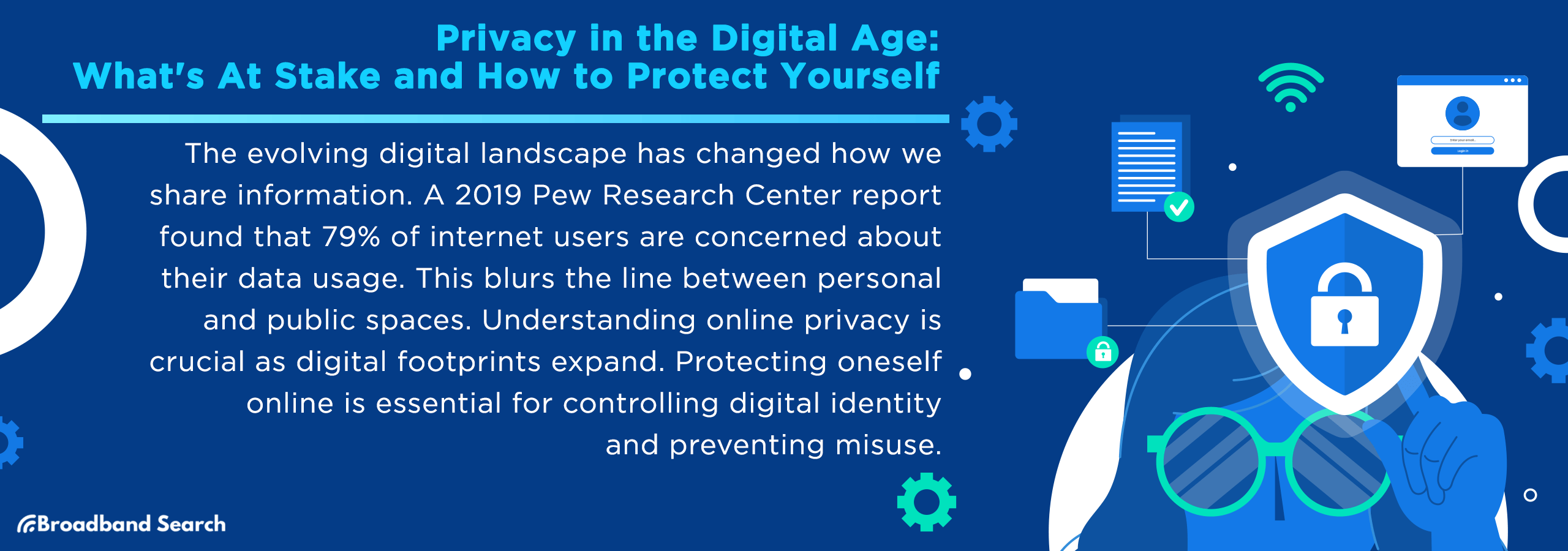The rapid evolution of the digital landscape has fundamentally altered how we share and store information. Recent studies, including a 2019 report by the Pew Research Center, indicate that 79% of internet users are concerned about the way their data is being used by companies online. This underscores the dwindling boundaries between personal spaces and public platforms. As the digital footprint of individuals expands, understanding the implications of online privacy becomes paramount.
Protecting oneself from the internet isn't just about reclaiming personal space; it's an essential step towards exerting control over one's digital identity and safeguarding personal information from potential misuse.
The Current State of Digital Privacy
Key Privacy Concerns in the Digital Age
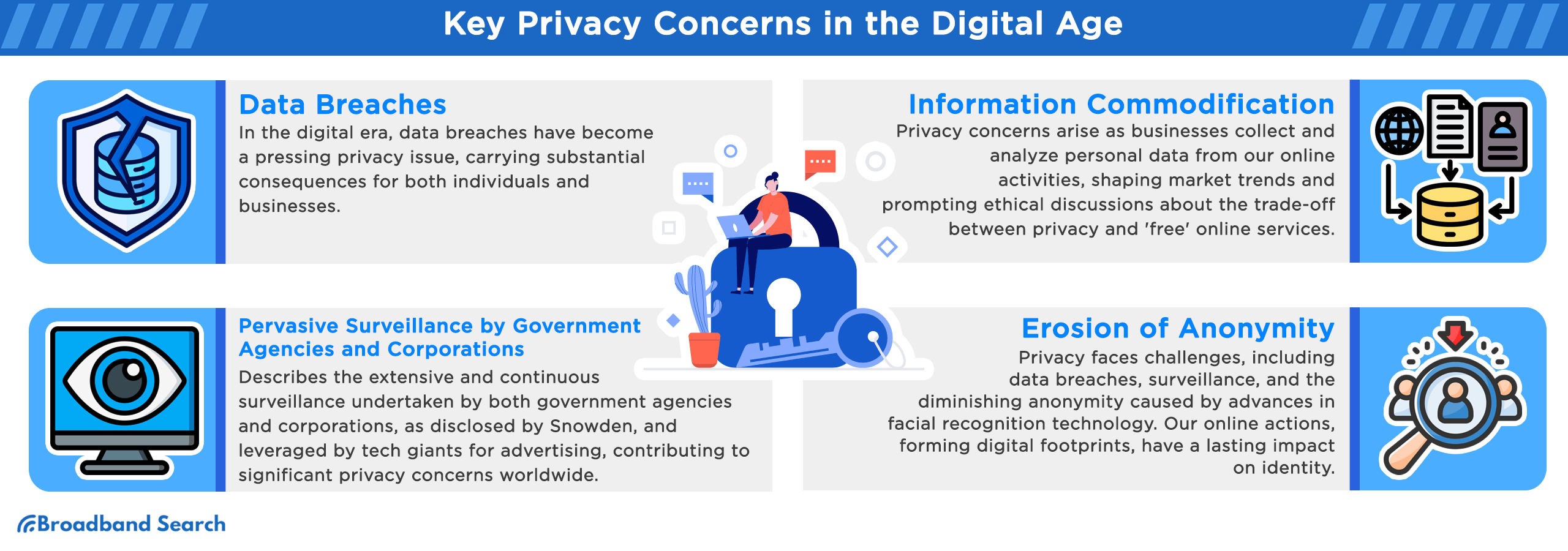
In today's time, personal data becomes currency, often traded without consent. This era brings unprecedented challenges to privacy, necessitating astute strategies to safeguard our digital footprint against invasive technologies and malevolent actors.
Data Breaches
Data breaches have emerged as a critical privacy concern in the digital age, with significant ramifications for individuals and businesses alike. One notable incident, the Equifax breach of 2017, stands as a stark example. This breach exposed sensitive information, including Social Security numbers, of approximately 147 million consumers. The repercussions were widespread, highlighting the vulnerability of personal data and the far-reaching consequences when such breaches occur.
Beyond the immediate fallout, data breaches erode personal security and engender mistrust in digital platforms. They can lead to identity theft, financial fraud, and emotional distress for victims. Moreover, they undermine trust in organizations responsible for safeguarding our data, which, in turn, hampers our willingness to participate in an increasingly interconnected digital world.
Surveillance by Governments and Corporations
Pervasive surveillance by both government agencies and corporations has raised significant privacy concerns. The revelations brought to light by Edward Snowden in 2013 regarding the National Security Agency’s (NSA) mass surveillance programs sent shockwaves worldwide. These disclosures shed light on the extent to which governments were collecting and monitoring citizens' digital data, sparking a global debate on the balance between security and privacy.
Simultaneously, tech giants like Google and Facebook have harnessed user data to fuel personalized advertising, bolstering their revenue streams. This practice not only funds the digital services we rely on but also blurs the lines between convenience and intrusiveness.
Information Commodification
One of the most pressing privacy concerns revolves around the commodification of personal information. Our online activities generate a treasure trove of data, which businesses eagerly collect, analyze, and transform into a valuable commodity. This data-driven economy wields substantial influence, shaping market trends and consumer behaviors. It allows companies to tailor products, services, and advertisements with remarkable precision, blurring the line between personalization and intrusion.
The ethical implications of this data-for-service exchange are increasingly evident. As individuals enjoy the convenience of "free" online services, they unwittingly trade their privacy. This ethical quandary forces us to consider the true cost of digital convenience and prompts discussions about the need for more transparent data practices, stronger regulations, and the importance of informed consent in the ever-evolving landscape of information commodification.
Erosion of Anonymity
Today, we face broader privacy issues, including not only data breaches and surveillance but also the loss of anonymity. Advances in facial recognition technology have raised questions about personal privacy. The proliferation of this technology poses challenges to maintaining anonymity in an increasingly interconnected world, with implications spanning from public surveillance to social media platforms.
Moreover, the concept of digital footprints underscores the near-permanent nature of our online activities. Once information is posted, it often becomes indelible, shaping our online identity and potentially impacting real-world opportunities. These facets of the digital age demand a nuanced understanding of how our actions online can affect our personal privacy and long-term anonymity.
Potential Risks of Compromised Digital Privacy
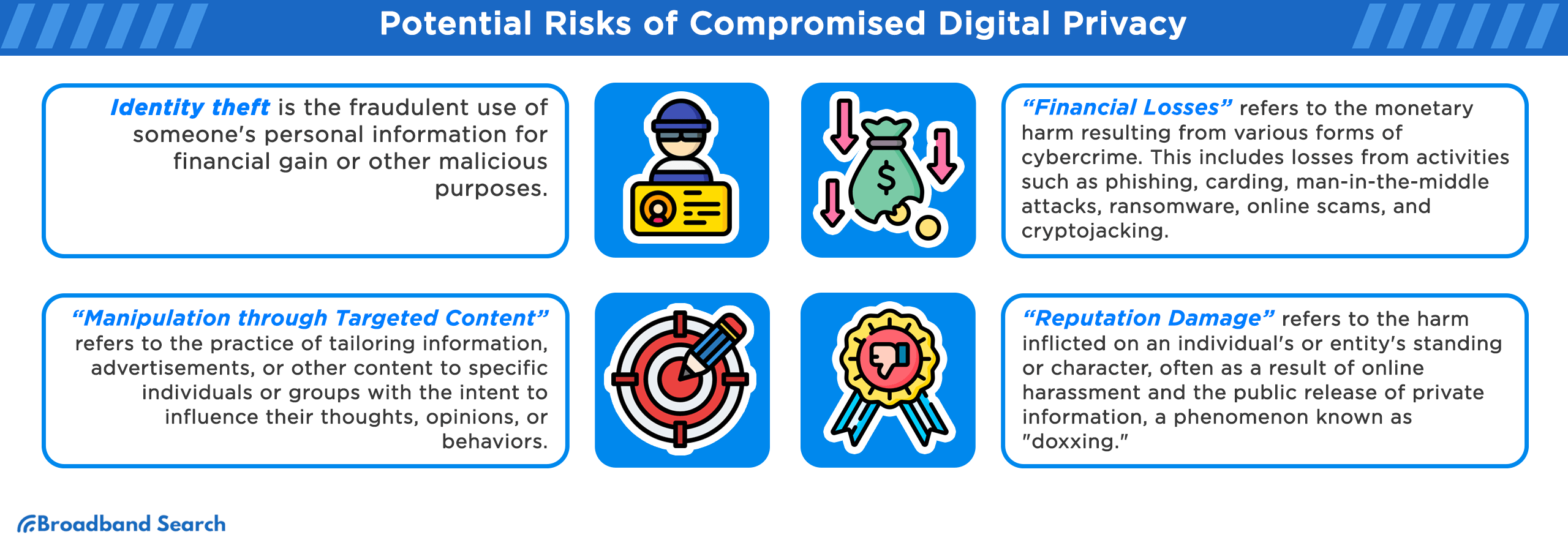
Identity Theft
Identity theft poses a grave risk in the digital age, with potentially devastating consequences for victims. It occurs when malicious actors obtain and misuse an individual's personal information, often for financial gain. The aftermath of such an incident can be financially and emotionally distressing. Victims may experience drained bank accounts, fraudulent credit card charges, and damaged credit scores. Moreover, identity theft can lead to a prolonged and arduous process of reclaiming one's identity and rectifying the harm inflicted.
In today's interconnected world, identity theft remains a looming threat. Cybercriminals exploit lax security measures or human errors to access personal details, paving the way for financial fraud, damage to credit reputation, or misuse of one's identity in cybercrimes. Such breaches not only leave the victim in a financial quagmire but can have profound psychological impacts, affecting their trust in digital systems.
Two real-life cases illustrate the severity of these repercussions:
- Target Data Breach (2013): Hackers gained access to Target's customer database, compromising the credit and debit card information of 40 million customers. This breach resulted in substantial $18 million in state settlements for affected individuals, eroded trust in the retail giant, and highlighted the vulnerability of personal data.
- Yahoo (2013-2014) - In one of the largest breaches ever, data from 3 billion accounts were exposed. This incident not only decreased Yahoo's sale value by $350 million but shook user confidence in email services' security globally.
These cases underscore the urgent need for robust digital privacy measures and proactive steps to safeguard personal information in an interconnected world.
Manipulation through Targeted Content
The Cambridge Analytica scandal spotlighted how Facebook data was exploited to influence voter opinions during the 2016 U.S. presidential election, showcasing the pernicious power of targeted content. This breach underscores the stealthy ways our digital footprints can be harnessed against us.
Algorithms, while seemingly impartial, carry significant consequences:
- Confirmation Bias Amplification: Algorithms often feed users content aligning with their existing beliefs, narrowing perspectives and stifling critical thought.
- Consumer Behavior Manipulation: By understanding preferences, companies can subtly nudge purchasing decisions, often benefiting corporate interests over individual needs.
- Societal Polarization: With tailored content reinforcing extreme views, societies can witness increased polarization, undermining communal harmony.
Financial Losses
Compromised digital privacy carries the significant risk of financial losses, a concern underscored by alarming statistics. In 2021 alone, cybercrime led to an estimated global financial loss of over $1 trillion, affecting individuals and organizations alike. Various types of online financial frauds contribute to this staggering figure:
- Phishing: Fraudsters use deceptive emails or messages to extract sensitive information, such as login credentials or credit card details, posing as trusted entities.
- Carding: Unauthorized use of credit card details to make purchases.
- Man-in-the-Middle Attacks: Interception of transactions to divert funds.
- Ransomware: Holding digital assets hostage, demanding payment for release.
- Online Scams: These encompass a wide range of deceitful schemes, from fake online marketplaces to cryptocurrency scams, exploiting unsuspecting individuals.
- Cryptojacking: Covert use of one's device for cryptocurrency mining.
Reputation Damage
As the internet's reach extends, so does its capacity for harm. Instances of online harassment, particularly “doxxing” — the public release of private information — have wreaked havoc. Two major cases that underscore the real-life consequences of such attacks are the GamerGate controversy and the harassment campaign against Leslie Jones.
- GamerGate (2014): This online harassment campaign targeted women and minorities in the video game industry. It involved doxxing, threats, and character assassination, causing significant harm to individuals' personal and professional lives.
- Leslie Jones (2016): The actress and comedian became a victim of online harassment, with her personal information exposed and racist abuse directed at her. This not only damaged her reputation but highlighted the vulnerability of even high-profile individuals to online attacks.
In navigating the digital age, individuals are confronted with the complex task of reputation management. This involves:
- Online Presence Scrutiny: Vigilance in monitoring one's online presence to preemptively address any harmful or false information.
- Digital Self-Defense: Employing privacy settings and security measures to protect personal information and reduce vulnerability to attacks.
- Legal Recourse: Exploring legal options to address defamation or harassment, which can be challenging in the borderless realm of the internet.
- Education and Awareness: Cultivating digital literacy to recognize and mitigate the risks associated with online behavior.
Ways to Protect Digital Privacy
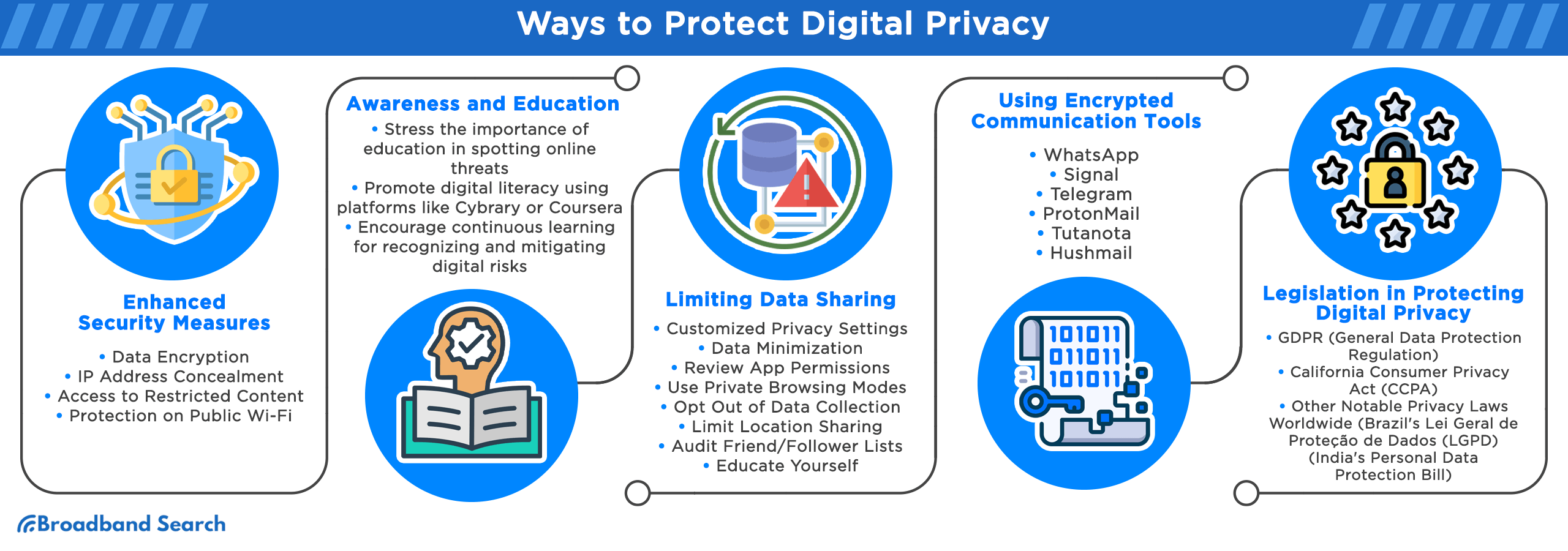
Enhanced Security Measures
Protecting digital privacy in an increasingly interconnected world necessitates the implementation of enhanced security measures. First and foremost, employing sophisticated passwords and enabling two-factor authentication (2FA) emerges as a primary defense mechanism. The statistics speak volumes, with research showing that 2FA can block up to 99.9% of automated attacks, significantly bolstering account security.
Furthermore, the use of Virtual Private Networks (VPNs) plays a pivotal role in maintaining online anonymity and safeguarding data. The benefits of utilizing a VPN are manifold:
- Data Encryption: VPNs encrypt internet traffic, rendering it unreadable to potential eavesdroppers, ensuring data confidentiality.
- IP Address Concealment: They hide users' IP addresses, enhancing online anonymity and privacy.
- Access to Restricted Content: VPNs enable access to geo-restricted content, broadening online experiences.
- Protection on Public Wi-Fi: When connected to public Wi-Fi, VPNs shield users from potential security vulnerabilities, reducing the risk of data breaches.
By advocating these security measures, individuals can take proactive steps to fortify their digital privacy and protect themselves from an array of online threats, ultimately ensuring a safer and more secure online presence.
Awareness and Education
Recognizing the importance of education in identifying malicious emails, links, and potential online threats is paramount. According to Deloitte research, 91% of cyberattacks begin with a phishing email, emphasizing the critical role of user vigilance in safeguarding personal information.
Promoting digital literacy and awareness, various resources and platforms offer invaluable knowledge. Prominent resources like Cybrary or Coursera offer courses that not only identify threats but also instill proactive habits, enhancing overall digital safety and literacy for individuals navigating the online sphere. By fostering a culture of continuous learning and awareness, users can equip themselves with the skills needed to recognize and mitigate digital risks, ensuring a safer online experience for all.
Limiting Data Sharing
Adopting strategies to limit data sharing can substantially shield one's digital identity. A Pew Research study indicated that 32% of younger respondents actively restricted data sharing with companies.
- Customized Privacy Settings: Tailor privacy settings on social media profiles to limit the audience who can view your content.
- Data Minimization: Share only necessary information when creating accounts on websites or apps. Avoid volunteering excessive personal data, as even seemingly benign details can be exploited.
- Review App Permissions: Regularly audit and revoke unnecessary app permissions on your devices.
- Use Private Browsing Modes: Employ private browsing modes offered by browsers like Chrome or Firefox to prevent tracking and data collection while online. Surveys indicate that 58% of users are concerned about online tracking.
- Opt Out of Data Collection: Explore platforms that allow users to opt out of data collection entirely, preserving anonymity and privacy. A recent poll found that 86% of respondents were willing to opt out of data tracking if given the option.
- Limit Location Sharing: Be cautious with location sharing, especially in public posts, as it can expose your whereabouts.
- Audit Friend/Follower Lists: Regularly audit and remove individuals you no longer wish to share with.
- Educate Yourself: Stay informed about platform updates and their implications for your data privacy.
Additionally, consider utilizing tools and browsers prioritizing user privacy and data protection such as:
- DuckDuckGo: A privacy-focused search engine that doesn't track your searches.
- Brave: A web browser that blocks ads and trackers by default.
- Tor Browser: Anonymizes user's online actions, making tracking nearly impossible.
These measures empower users to take control of their digital privacy, ensuring a safer and more private online presence.
Using Encrypted Communication Tools
Securing privacy online hinges on using encrypted communication tools that shield sensitive information from prying eyes. Three of the most prominent options known for their robust end-to-end encryption are:
- WhatsApp: This messaging app encrypts messages, calls, photos, and videos end-to-end, ensuring that only the sender and recipient can access the content. Over 2 billion users trust WhatsApp for secure communication.
- Signal: Signal boasts a reputation for unparalleled privacy. It not only encrypts messages but also minimizes data collection, ensuring that user information remains confidential. In recent years, Signal has gained popularity for its strong commitment to privacy.
- Telegram: Telegram offers optional end-to-end encryption for messages and calls, providing users with a choice between standard and secret chats. With over 700 million users, it is a widely adopted secure messaging platform.
In addition to encrypted messaging apps, secure email services play a pivotal role in safeguarding digital communications. Three notable choices in this realm are:
- ProtonMail: ProtonMail prioritizes user confidentiality with end-to-end encryption and strict data protection policies. It's a preferred choice for those seeking secure email communication.
- Tutanota: Tutanota is another secure email provider that offers end-to-end encryption, ensuring that only the intended recipient can access your messages.
- Hushmail: Hushmail combines encryption with user-friendly features, making it an accessible choice for those seeking secure email communication.
These encrypted communication tools empower individuals to protect their digital privacy and maintain confidentiality in an era marked by growing concerns about data security and surveillance.
The Role of Legislation in Protecting Digital Privacy
GDPR (General Data Protection Regulation)
The General Data Protection Regulation (GDPR), implemented in 2018, stands as a landmark legislation aimed at safeguarding digital privacy. It seeks to protect user rights and elevate data protection standards across the European Union. Beyond its immediate impact on businesses' data handling practices, the GDPR has spurred global conversations about digital privacy and data protection laws. Its principles of transparency, user consent, and data portability have catalyzed discussions on a worldwide scale, influencing the evolution of digital privacy legislation and fostering greater awareness of individual rights in the digital age.
California Consumer Privacy Act (CCPA)
The California Consumer Privacy Act (CCPA) has emerged as a significant player in the realm of digital privacy legislation. Its key provisions empower California consumers with rights to access, delete, and opt-out of the sale of their personal information. This groundbreaking legislation has profound implications for businesses operating in California, requiring them to enhance transparency and data protection measures.
Furthermore, the CCPA's influence reaches beyond state lines, as it paves the way for potential privacy legislation in other U.S. states and sparks global discussions about data protection laws. As the digital landscape continues to evolve, understanding the CCPA's provisions and its potential impact on digital privacy rights is essential for businesses and consumers alike, offering insights into the shifting landscape of data privacy regulation.
Other Notable Privacy Laws Worldwide
Beyond the GDPR and CCPA, other notable privacy laws are shaping the global landscape of digital privacy. Brazil's Lei Geral de Proteção de Dados (LGPD) and India's Personal Data Protection Bill are significant examples, emphasizing user rights, data protection, and stringent regulations on data handling practices.
These laws reflect a broader trend toward enhanced digital privacy protection worldwide. Analyzing global privacy legislation reveals common themes, such as transparency, user consent, and data portability. Understanding these trends is crucial in predicting the future of digital privacy norms and the evolving landscape of data protection on a global scale.
The Future of Privacy in the Digital Age
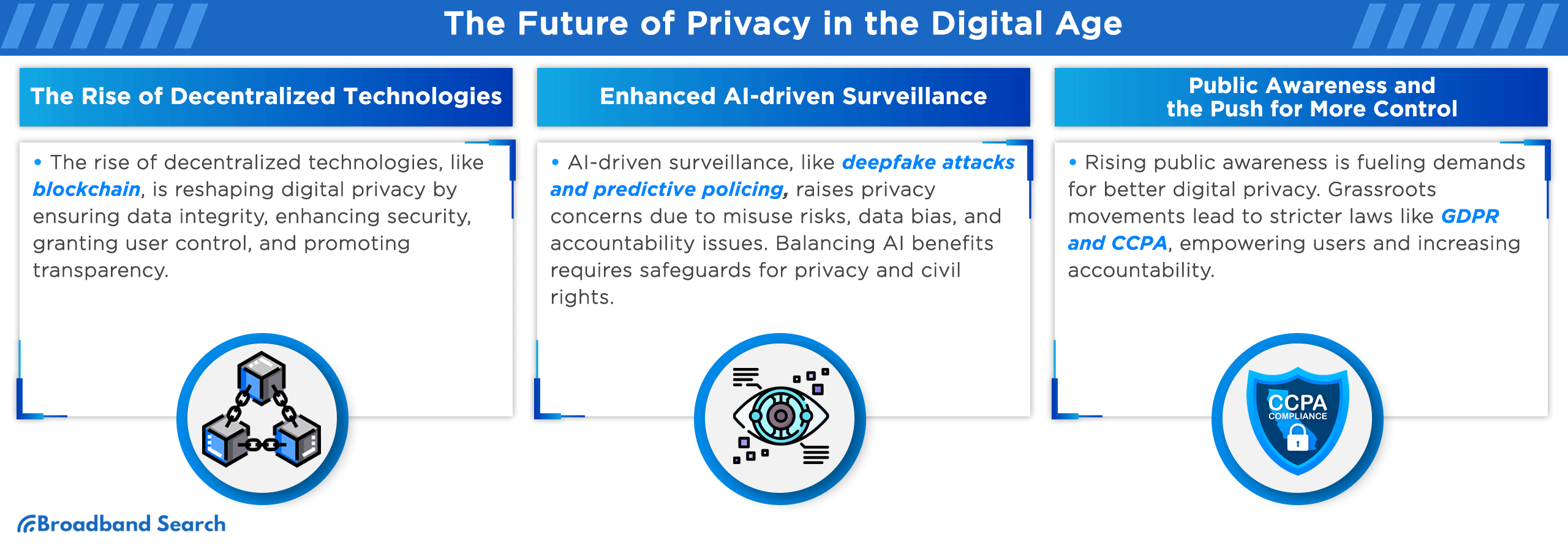
The Rise of Decentralized Technologies
The digital age is witnessing a paradigm shift in data privacy with the rise of decentralized technologies. Blockchain, in particular, is poised to revolutionize data integrity and user control over personal information.
- Immutable Records: Blockchain's inherent structure ensures data integrity, making it nearly impossible to alter or manipulate records. This is crucial for preserving the accuracy of personal information.
- Enhanced Security: Blockchain's encryption and consensus mechanisms bolster data security. It is estimated that blockchain can reduce fraud-related costs by up to 70%.
- User Control: Decentralized technologies like blockchain empower users with greater control over their personal data. Statistics show that 83% of consumers are concerned about how companies use their data.
- Transparency: The transparent nature of blockchain transactions enhances trust and accountability. Approximately 55% of consumers are more likely to trust businesses that use blockchain.
Additionally, the emergence of decentralized identity systems is revolutionizing digital privacy by enabling users to manage and control their online identities securely. These systems have the potential to reduce the risks associated with centralized identity management and data breaches, offering a promising future for digital privacy in the digital age.
Enhanced AI-driven Surveillance
The future of digital privacy is at a crossroads with the proliferation of AI-driven surveillance technologies. Deepfake technology, while impressive, raises serious concerns about its potential for malicious activities. Statistics reveal that deepfake usage in cyberattacks rose by 250% in 2020. Its capability to manipulate audio and video content for nefarious purposes, such as impersonation or spreading false information, poses a significant threat to personal privacy.
Additionally, predictive policing technologies, while aiming to enhance law enforcement, demand careful scrutiny due to potential biases and ethical considerations. Three key issues include:
- Bias in Data: Predictive policing systems may inadvertently perpetuate biases present in historical crime data, leading to unfair profiling and targeting of specific communities.
- Privacy Intrusion: Extensive data collection in predictive policing can infringe on individual privacy rights, as it often involves mass surveillance and data analysis.
- Accountability: Ensuring transparency and accountability in the use of AI-driven surveillance technologies is essential to prevent potential abuses and violations of civil liberties.
As we move forward, it is crucial to balance the potential benefits of AI-driven surveillance with safeguards that protect individual privacy and civil rights.
Public Awareness and the Push for More Control
Public awareness is becoming a driving force for enhanced digital privacy protections. Grassroots movements advocating for these protections are gaining momentum. Their efforts result in:
- Legislative Change: Public pressure leads to the creation of stricter privacy laws, like GDPR and CCPA.
- User Empowerment: Awareness campaigns educate users on safeguarding their digital privacy.
- Greater Accountability: Increased awareness holds businesses and governments accountable for their data handling practices.
Moreover, societal norms and values are shifting toward valuing digital privacy and data protection. People are becoming more conscious of their online footprint and the potential risks of sharing personal information. As this awareness grows, it influences how individuals, businesses, and governments approach digital privacy, heralding a future where control over personal data is paramount.
Wrapping Up
In the words of renowned computer scientist Whitfield Diffie, "Privacy is necessary for an open society in the electronic age." These words underscore the timeless importance of safeguarding digital privacy in our ever-evolving technological landscape. To ensure a future where privacy remains a fundamental right, being proactive is not just a choice but a necessity.
It is a collective responsibility that spans individuals, corporations, and governments. Individuals must stay informed, adopt secure practices, and demand transparency from those handling their data. Corporations must prioritize user privacy, implement robust security measures, and adhere to ethical data practices. Governments, in turn, must enact and enforce legislation that strikes a balance between innovation and privacy, ensuring that citizens' digital rights are preserved.
In this digital age, where information is both a currency and a commodity, protecting digital privacy is not a passive act but an active commitment. It is a commitment to preserving the principles of autonomy, security, and trust in our interconnected world. Together, we can navigate the complex terrain of the digital age while upholding the values that underpin a free and open society.
FAQ
How do cookies impact my online privacy?
Cookies are small text files used by websites to remember users and their preferences. While they can enhance the browsing experience, they can also track user behavior, potentially compromising online privacy.
Is using public Wi-Fi risky for my digital privacy?
Public Wi-Fi networks, like those in coffee shops or airports, are often unencrypted, making it easier for hackers to intercept data or direct users to malicious websites.
What is the role of search engines in digital privacy?
Many search engines track user searches, which can be used for targeted advertising or sold to third parties. Some search engines, like DuckDuckGo, prioritize user privacy by not tracking searches.
Why is end-to-end encryption important for messaging apps?
End-to-end encryption ensures that only the sender and receiver can read a message, preventing potential interception by hackers, service providers, or even government entities.
Can deleting my content or account ensure the removal of my data from a platform?
While deleting might remove visible content, many platforms retain data backups or logs. It's essential to check platform policies on data retention and deletion.

